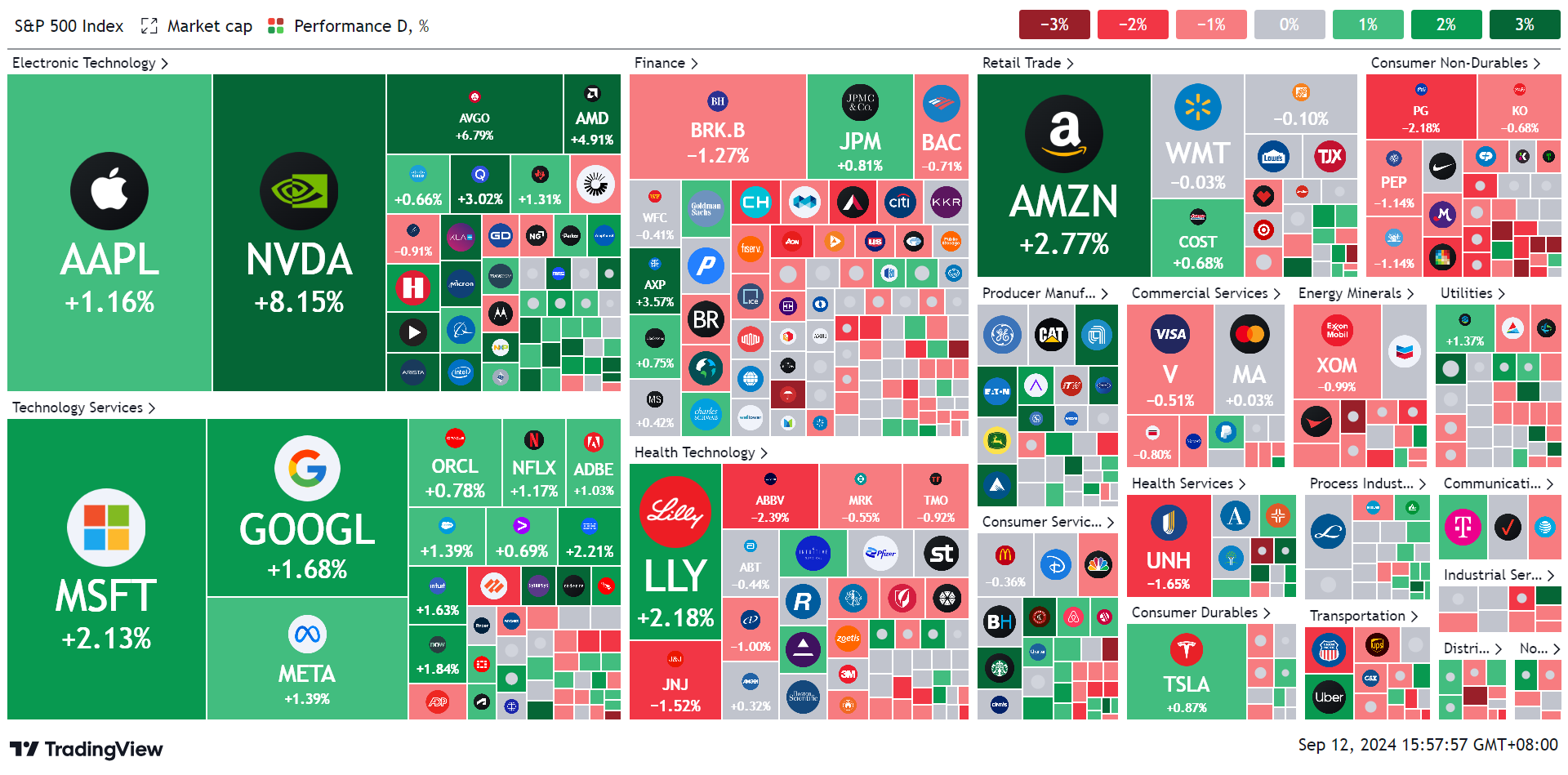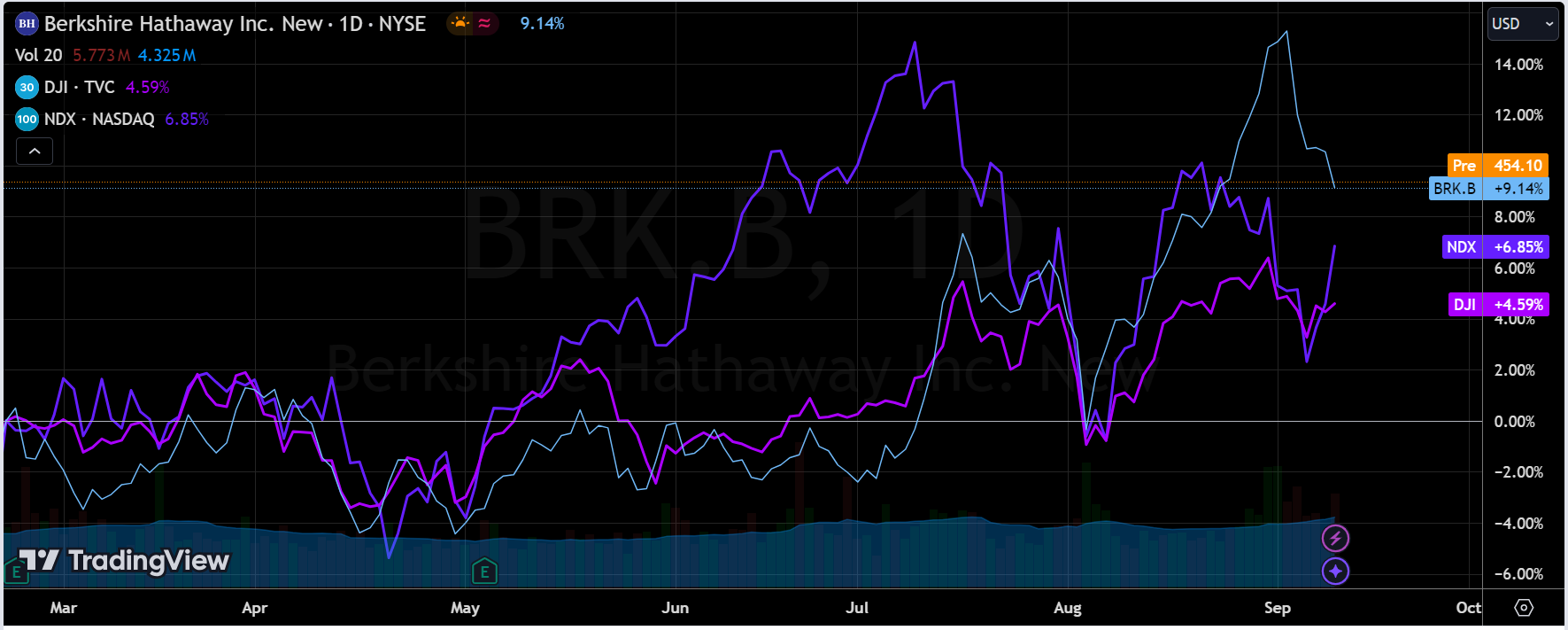Why Berkshire dips on a market surging day?
9.11 is quite sensitive to Americans, but the good thing is that the market pulled up strongly on that day, hard from down 2 points to up 2 points, the most important of which is still $NVIDIA Corp(NVDA)$ 's 8% jump, and risk appetite is back.
Of course, market divergence is still there, energy $Energy Select Sector SPDR Fund(XLE)$ onsumer goods sector $Consumer Discretionary Select Sector SPDR Fund(XLY)$ due to the industry cycle and macro-economic reasons, is still relatively weak performance.Risk aversion in the healthcare sector $Health Care Select Sector SPDR Fund(XLV)$ is also flowing out, while the banking sector is also under pressure due to interest rate cuts. $Financial Select Sector SPDR Fund(XLF)$

Buffett's half position in Apple sold right? Let's talk about a different perspective.
$Apple(AAPL)$ is currently facing several issues:
Antitrust, especially the growing controversy over the "Apple Tax";
AI lacks autonomous products and may need to cooperate with other vendors in the next cycle;
Consumer goods weak cycle, iPhone and other electronic products sales are still likely to be less than expected
These are actually included in the market's expectations for Apple, and the current tug-of-war is more about Apple's own buybacks as well as investors' incremental gains from the AI landing.Surely these Buffett must know.
The biggest difference between Buffett, as an Apple investor, and other ordinary investors, is that he has a lot of cash (dollars) on hand, and it just so happens that Apple has a lot of dollars lying around on its balance sheet.
Apple with so much money, the main investment is a large number of buybacks, in addition to some small start-up company investment.
Since Apple holds the money is also to buy Apple, Buffett is also to buy Apple, equivalent to a certain degree of "leverage", and some of the startup investment, although it may be very good, but may not be the scope of Buffett's consideration.
Therefore, Buffett cut off half of the position, just in the reduction of stock risk exposure, to maintain more "cash", and not really on the Apple investment change of view.
In fact, we can also see from the recent performance of Berkshire's stock that it has a stronger relationship with $DJIA(.DJI)$ Dow Jones Index than $NASDAQ(.IXIC)$ .BRK's huge amount of cash has also attracted more safe-haven money.
So once the market's risk appetite changes, BRK may not necessarily go the same way as AAPL, but instead correlate with investor preference.When ever Warren Buffett looks at NVIDIA, then the market sentiment may completely change.
Who are the winners of rising market risk appetite?
AI sectors.Hardware in addition to $Nvidia (NVDA)$, there are also $Broadcom(AVGO)$ , $Qualcomm(QCOM)$ , $Taiwan Semiconductor Manufacturing(TSM)$ , etc., while the volatility of software is rather a bit lower, and the beneficiaries include the old $Oracle(ORCL)$ , $Salesforce.com(CRM)$ , $IBM(IBM)$ , $Intuit(INTU)$ , as well as $ServiceNow(NOW)$ , $Cloudflare, Inc.(NET)$ and so on.
Growth stocks. In particular, the recent elevated expectations for rate cuts, which are expected to be cut by 100 bps by the end of the year, could significantly reduce the level of the risk-free rate, boosting the valuations of growth stocks and facilitating their financing.ARKK's long positions in all of these companies are likely to continue to benefit, including ROKU, SQ, and PLTR, which has recently been included in the SPX
Cryptos Stocks.The volatility of digital currency related stocks has increased further due to more policy shaping the cryptocurrency space in an election year, with mainstream exchanges $Coinbase Global, Inc.(COIN)$ being a bit less volatile in relative terms and $MicroStrategy(MSTR)$ and others following the Bitcoin market.
Bioptechs. One category is pharma companies with dominant products, such as several of the diet drug ones, including $Novo-Nordisk A/S(NVO)$ , $Eli Lilly(LLY)$ , etc., and the other category is R&D biotechs, which may benefit more from interest rate changes.Traditional drug companies, or Medicare companies, $UnitedHealth(UNH)$ on the other hand, have exactly similar attributes and are instead defensive stocks.
Disclaimer: Investing carries risk. This is not financial advice. The above content should not be regarded as an offer, recommendation, or solicitation on acquiring or disposing of any financial products, any associated discussions, comments, or posts by author or other users should not be considered as such either. It is solely for general information purpose only, which does not consider your own investment objectives, financial situations or needs. TTM assumes no responsibility or warranty for the accuracy and completeness of the information, investors should do their own research and may seek professional advice before investing.
- CaseyLKC·09-15GreatLikeReport

